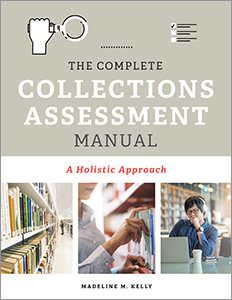Primary tabs
You don't need to be an ALA Member to purchase from the ALA Store, but you'll be asked to create an online account/profile during checkout to proceed. This Web Account is for both Members and non-Members. Note that your ALA Member discount will be applied at the final step of the checkout process.
If you are Tax-Exempt, please verify that your account is currently set up as exempt before placing your order, as our new fulfillment center will need current documentation. Learn how to verify here.
- Description
- Table of Contents
- About the author
- Reviews
Assessment is increasingly integral to building, managing, and justifying library collections. Unfortunately, assessment can also be a daunting undertaking. And though every institution is unique, as this manual demonstrates, there’s no need to reinvent the wheel. Spanning both concept and practice, Kelly offers a holistic assessment framework suitable to a variety of collections and contexts. With a structure that makes it applicable as both a training tool for practicing librarians and a useful course text for library students, this manual
- introduces foundational assessment methodologies then provides concrete guidance on how to contextualize those methodologies within a holistic collections assessment program;
- covers topics such as assessment goals, assessment stakeholders, selecting data and methodologies, working through project constraints, and project planning;
- includes sample assessment program structures and download links to assessment planning templates;
- provides step-by-step instructions for more than a dozen specific methodologies, describing which aspect of the collection is being measured, what goals the methodology can address, technological requirements, recommended visualizations, and other helpful pointers; and
- shares best practices for communicating effectively with internal and external stakeholders about assessment projects, with sample communication plans that can be easily adapted.
Bridging the divide between the big picture and the nitty gritty, this manual guides the reader through the development and implementation of a collections assessment program tailored to local needs and resources.
Examination copies are available for instructors who are interested in adopting this title for course use.
List of Figures
Acknowledgments
Introduction: How to Use this Book
Part I: Planning a Collections Assessment Program
1. Holistic Collections Assessment
Process Improvements
Assessment Outcomes
Organizational Benefits
Further Reading
References
2. Assessment Goals
How to Set Goals
Examples: Goals
Putting Goals, Questions, And Actions Together
3. Assessment Stakeholders
How to Identify Stakeholders
Working with Stakeholders
The Engagement Time Line
Examples: Collaboration Time Lines
Further Reading
4. Selecting Data and Methods
Choosing Your Framework
The Universe Of Data
Mapping Your Goals to the Data
Methods
Achieving Balance
Pursuing Inclusion
Achieving Sustainability
Assessment Tools
References
5. Project Planning
Anticipating Challenges
Developing a Formal Project Plan
Incorporating Assessment into the Workload
Example of a Project Plan
Further Reading
6. Communication Best Practices
Ongoing Communication
Communicating Your Results
Data Visualization
Sample Communication Plans
References
7. Special Considerations
Sampling
Structuring Data
Basic Data Cleaning
Merging Data
Pivot Tables
Data Validity
Interdisciplinary Assessments
Outcomes Assessment
User Privacy
Further Reading
Reference
Part II: Metrics and Methods
8. Putting the Pieces Together: How to Use Part II
Collections
9. Inventory
10. Reputable Bibliographies
11. Modified Brief Test
12. Uniqueness
13. Peer Benchmarking
14. E-Resource Environmental Scan
Users
15. Patron Demographic Mapping
16. User Surveys
17. Interviews
18. Focus Groups
19. Persona Exercises
Usage
20. Circulation Analysis
21. Physical Item Return on Investment
22. Interlibrary Loan Analysis
23. E-Resource Use Analysis
24. Turnaway Analysis
Citations
25. Citation Analysis
26. Constituent Publishing Outlets
27. Bibliometric Analysis
28. Altmetric Analysis
Part III: Appendixes
Appendix A: Assessment Planning Templates
Appendix B: Software to Support Assessment
Appendix C: Sample Collections Assessment Portfolios
Index
Madeline M. Kelly
Madeline M. Kelly is the Director of Collections at Western Washington University in Bellingham, WA, where she oversees Acquisitions/Serials/ILL/Course Reserves, Collections Assessment, Cataloging and Metadata Services, Circulation, and Maps within the Western Libraries. Kelly has authored articles, book chapters, and conference proceedings on collections assessment, and has presented and delivered workshops on the topic regionally and nationally. In her previous position as Head of Collection Development at George Mason University in Fairfax, VA, she developed and implemented a holistic collection assessment program and undertook dozens of assessment projects on an as-needed basis. At the consortial level, Kelly has served on numerous committees, including a statewide eresource assessment task force that culminated in the implementation of new holistic evaluation metrics. Kelly received her BA in English and Spanish from the University of Mary Washington and her MLS from Simmons College.
"A thorough, flexible, and modular guide to the holistic assessment of library collections ... Throughout the book, Kelly recognizes the need for diversity in collections and seeks to ensure that her readers do so as well, routinely warning of potential hazards in the metrics she discusses. For example, she notes the tendencies of core title lists, circulation and citation studies, and impact factors to confer privilege on already-dominant voices and to center those patrons who are already well served ... Could serve well as a base for a course module designed as an extended case study.”
— Technicalities
"This manual gives users the flexibility to choose their own collection development path; readers can easily jump to the most relevant chapters or sections. VERDICT: Recommended for librarians who work with collections, or for instructors who are interested in adopting this work as a teaching tool."
—Library Journal
"This is an extremely organized guide to collection assessment. Though Kelly’s background is primarily in academic libraries, the book's content is relevant to collections practices 'in any type and size of library' (p. xix) ... Required reading for those new to collection assessment, this excellent book provides all the information needed to begin a collection assessment project."
—Choice
"The manual is well written, effectively organized, and structured in a way that allows each reader to engage with the text, both cover-to-cover or as a quick reference resource ... A must-have resource for all librarians who are actively engaged in collections management.”
— Technical Services Quarterly



